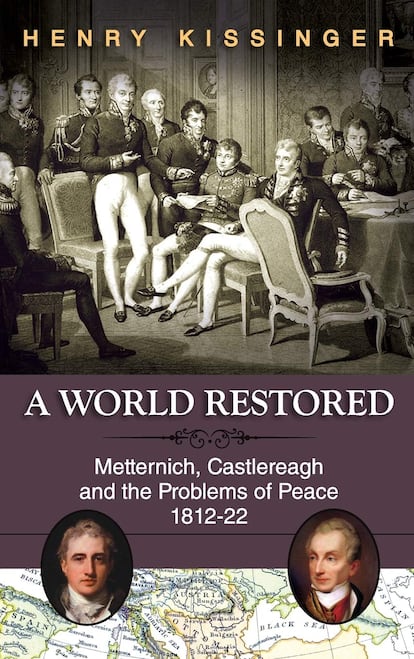Five essential books by Henry Kissinger: The scholar, the strategist and the intellectual
Since his doctoral dissertation, presented at Harvard in 1954, the most prominent, long-lived and controversial diplomat the United States has seen published valuable essays on politics and international relations over seven decades

On China (2011)
Everything signed by Henry Kissinger — who died on November 29 at the age of 100 — is of interest. Even for those who execrate him for his abundant and often deadly political sins. This book reflects his infatuation with China, arising from his and Nixon’s feat of opening the doors to Beijing’s return to the global stage and becoming a prominent actor in it. In On China, Kissinger recounts the entire history of the country and its relations with the United States, and the future he wishes for the emerging superpower, which the author hopes will be friendly, although he fears the opposite.
Like his World Order (2014) and the recent Leadership: Six Studies in World Strategy (2022), On China is a product of the efficient Kissinger factory, a consultancy that counts on the inspiration, wisdom and, of course, the signature of the most outstanding, long-lived and controversial diplomat the United States has ever seen.
Diplomacy (1994)
This is his first book addressed entirely to the general public, which received it, and continues to do so, as the synthesis of Kissinger’s historical thought and political experience. It is a popular book, full of aphoristic wisdom, but lacking in novelties. It serves as an excellent historical introduction for those interested in international relations and is a tribute to the most controversial, but also useful, concepts that inspire contemporary diplomacy, such as political realism, the power of force, the reason of state and the balance of power. It starts in the 17th century with the idea of the nation-state introduced by Cardinal Richelieu and the English idea of the continental balance of power to explain the tragic history of Europe, which was marked by the Napoleonic wars and, in the 20th century, by the two world wars.
Nuclear Weapons and Foreign Policy (1957)
This book is the one that consecrated him as a strategist in the emerging and still hesitant area of nuclear powers, and catapulted him into a political career as a presidential advisor. Already in the title, Kissinger points out the unusual fact that a new weapon, used on only one occasion, can occupy and condition all international politics, beyond the effect on battlefields, as had been the case with previous destructive technologies. Opposed to the previously established theory of a massive nuclear response to a hypothetical Soviet attack, Kissinger elaborates on the flexible response, which contemplates the use of the full range of economic, diplomatic and weapons tools available — including the tactical use of nuclear weapons and, of course, nuclear deterrence — before directly committing the United States to a massive nuclear war.

A World Restored: Metternich, Castlereagh, and the Problems of Peace 1812-22 (1957)
Kissinger as a whole — his political thought, his vision of the world and above all his realistic theory of international relations, based on the balance of power — is encapsulated in his doctoral thesis, presented at Harvard in 1954 and published as a book in 1957. From the study of the Europe that emerged from the Napoleonic wars and the peace organized at the Congress of Vienna, there emerged a model of the status quo that inspired much of his later career as a diplomat and presidential advisor. According to Kissinger’s doctoral thesis, stability and peace depend on the recognition of mutual legitimacy between the different powers in equilibrium, which is broken as soon as one emerging power challenges the legitimacy of the others — a situation that occurred repeatedly in the 20th century, on the part of Germany and the Soviet Union, and which is now being repeated again with Russia and also with China, and which fits perfectly with the current world disorder.
The White House Years (1979), Years of Upheaval (1982), Years of Renewal (1999)
The thick volumes of his memoirs as Secretary of State and National Security Advisor under Republican Presidents Richard Nixon and Gerald Ford, belong to a different register, that of the statesman engaged in one of the most controversial and tragic stages of the history of his adopted country (he was born in 1923 in the Weimar Republic, a period in Germany’s history between 1918 and 1933). It was a stage in which Kissinger acted at the margin of what is considered morally acceptable, making decisions that led him to be accused of committing war crimes and crimes against humanity, all of which were never placed on trial. The imprint of his eight years in the White House persists to this very day, hence the value — not only documentary and testimonial — of these 3,800 memorial pages, which contain numerous keys, reflections and analyses, as well as ellipses and even misrepresentations, essential to understanding the role of the United States in shaping the world during the second half of the 20th century.
Sign up for our weekly newsletter to get more English-language news coverage from EL PAÍS USA Edition
Tu suscripción se está usando en otro dispositivo
¿Quieres añadir otro usuario a tu suscripción?
Si continúas leyendo en este dispositivo, no se podrá leer en el otro.
FlechaTu suscripción se está usando en otro dispositivo y solo puedes acceder a EL PAÍS desde un dispositivo a la vez.
Si quieres compartir tu cuenta, cambia tu suscripción a la modalidad Premium, así podrás añadir otro usuario. Cada uno accederá con su propia cuenta de email, lo que os permitirá personalizar vuestra experiencia en EL PAÍS.
¿Tienes una suscripción de empresa? Accede aquí para contratar más cuentas.
En el caso de no saber quién está usando tu cuenta, te recomendamos cambiar tu contraseña aquí.
Si decides continuar compartiendo tu cuenta, este mensaje se mostrará en tu dispositivo y en el de la otra persona que está usando tu cuenta de forma indefinida, afectando a tu experiencia de lectura. Puedes consultar aquí los términos y condiciones de la suscripción digital.









































